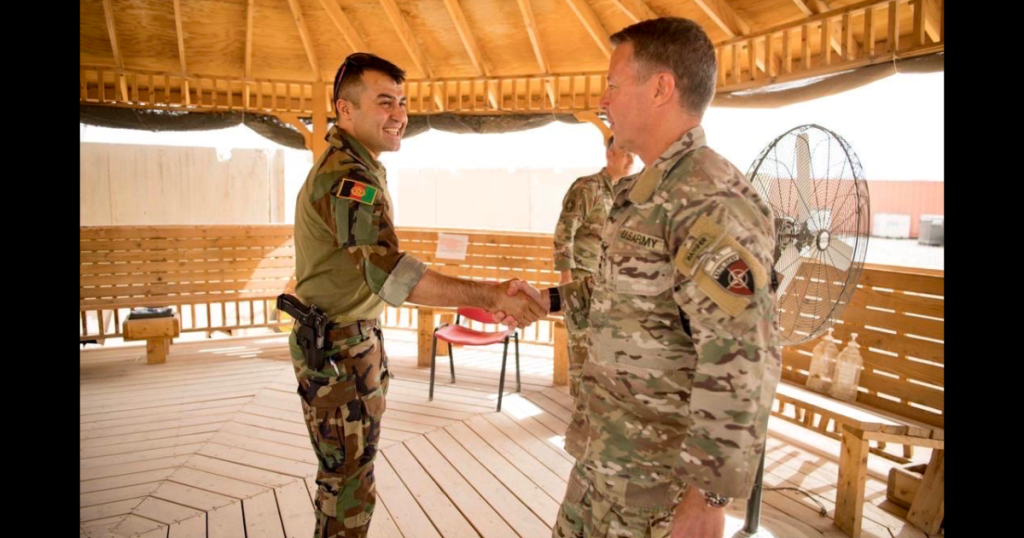Lieutenant General Sami Sadat
When America retreated from Kabul amid chaos in 2021, Lieutenant General Sami Sadat, the last commander of the army of the Afghan Republic, was still fighting to the end.
Sadat’s firsthand account of the disastrous withdrawal and the failures of the Biden-Harris administration are recounted in his new book, The Last Commander.
Sadat has shared an excerpt from the book with The Gateway Pundit.
Chapter 1: Two Betrayals (2021)
A week before the fall of Afghanistan in 2021 I was still holding Helmand, the province the Taliban most wanted to take, while the rest of the country collapsed. I was ordered back to Kabul, first to command all Afghan special forces, and the next day to stage a last-ditch defense of the capital itself. But it was too late. By the time I arrived nothing functioned. When President Ashraf Ghani fled from the presidential compound in a helicopter, telling no one, it was all over. The government imploded. I was the last commander still standing, trying to coordinate the defense of the capital after government ministers ran away. Even the air force had gone as pilots saved their aircraft and flew across the northern border to safety into neighboring Central Asian states.
So who was to blame for the collapse? Direct responsibility lies with the US, and specifically with former president Barack Obama and his Democratic successor, Joe Biden. Obama, who from the outset was clearly intent on withdrawing the US from the global War on Terror launched by President Bush, spent the whole of his first year in office delaying any decision about Afghanistan. Finally he agreed to send more troops, but only on the condition that they left on a strict timetable. This emboldened the Taliban, who knew they had only to wait it out and America would leave. The Taliban had a saying: “Americans may have a watch, but we have the time.”
Back in 2009 Afghan forces were not yet ready to take on the fight for ourselves, and while we were still building our military strength, America’s generals constantly argued for enough troops to fight alongside us—ready to stay until the job was done, not on a short-term artificial timetable. A new generation of generals, David Petraeus and Stanley McChrystal foremost among them, had studied counterinsurgency and wanted to put it into practice in Afghanistan. They knew it would need sustained support in terms of numbers of troops and time. But the strict timetable doomed their best efforts. Just as they reached the peak of the increase, troops began to leave on a downward slide due to finish in 2014. Revealing the date when Americans would leave the battlefield gave the Taliban a huge advantage.
But the long years of training made a difference. In 2019, Afghan forces went on the offensive, taking and holding ground for the first time on our own. I was one of a group of younger Western-trained Afghan generals put into senior positions by a new and ambitious defense minister, who decisively changed the course of the war in our favor, winning across the country. I am convinced that if we had retained consistent US air support we would have seen a dramatic increase in ground securely held by our forces, while the Taliban would have been reduced to a small insurgency, no longer a strategic threat by 2021. We had better troops, better equipment, and had developed the ability to mount many complex operations on our own.
But we still needed American planes to engage the most difficult targets, and a whole lot else besides. And in 2020 once again that support became conditional, time-limited, when President Trump agreed to a bad deal with the Taliban in Doha. It was a withdrawal deal, not a real negotiation to end the war. As a result, we were forced to release thousands of high-value Taliban prisoners from jail with only a vague promise from the Taliban to sever their links with al-Qaeda. We learnt a new English verb, “retrograde”—meaning taking out all the American military hardware in the country. It was later used as the title of a documentary about my last months in command.
When he came into office, President Biden could have taken a breath after the Trump years and reviewed Afghan policy. The Taliban had broken both the public and secret terms of the Doha deal. They had not severed links with al-Qaeda, many of those released from jail were back on the battlefield, and there were attacks on US bases and provincial capitals across the country. These attacks were not publicized at the time, however.
Trump had drawn the number of American troops down to just twenty-five hundred at the end of his presidency, and Biden was under pressure from his generals to keep them there. Along with troops from a number of allies, notably Turkey, Germany, Italy, and the UK, there were around ten thousand international troops in all—enough to give Afghan forces the basic support we needed to take the fight to the Taliban, if we had been allowed to do it.
A month after Biden’s inauguration, in February 2021, General Joe Dunford, the former chairman of the Joint Chiefs of Staff, who had commanded in Afghanistan, wrote an influential report arguing that keeping troops at this level for the medium term was a wise and affordable insurance policy. Otherwise, he wrote, international terrorists, including al-Qaeda and IS-K, would be able to “rebuild their capabilities in the Afghanistan-Pakistan region such that they might be able to attack the US homeland within eighteen to thirty-six months.”
Biden was not listening—and was evidently not getting intelligence that would have told him how bad this withdrawal would be. In a reverse of how intelligence should work, under Biden the White House tells the CIA what the president wants to hear, regardless of its importance or level of threat to the US and the rest of the world. Policy became a show rather than a program to save lives and make the world a safer place.
Our American military partners were as frustrated as we were. On a visit to Navy SEAL headquarters in Camp Dwyer, in a remote corner of Helmand in the southwest in January 2021, General Scott Miller and I sat in a secret operations room where the SEALS briefed us that they continued to track Taliban positions across the country. “If the peace talks fail,” a SEAL commander said, “we could destroy the Taliban in nine days in Helmand.”
But the talks between the Afghan government and the Taliban did fail, and Biden turned his back on Afghanistan nonetheless. Beyond a pause to extend the off-ramp so the final out date was September, not May, he had no appetite for longer involvement. He may have lost the argument for a drawdown in the Obama White House in 2009. Now that he was in charge, his withering contempt for my country came to the fore.
On April 14, 2021, after announcing the final out date in the Treaty Room in the White House, where President George W. Bush had launched the war in 2001, Biden walked in light rain along lines of graves in Section 60 of the Arlington cemetery, where the dead of America’s recent wars are laid to rest. He said that the final withdrawal had not been a hard decision to make. To him it was “absolutely clear.” With the defeat of al-Qaeda and the death of Osama bin Laden, there was no reason to stay in Afghanistan, a country that in his words had “never been united.”
Biden handed another propaganda victory to our enemies by choosing September 11, 2021, as the date the last soldier had to leave. This is a day celebrated by terrorists around the world as they remembered the attacks on America in 2001. It was as if Osama bin Laden had come back to life and asked for this date, so they could celebrate another victory against America. He was forced to bring it forward to August but the damage was done.
The idea that we were beyond hope or help betrayed not only Afghanistan. Biden also betrayed the thousands of American troops and development workers who had been alongside us since 9/11, not always spending money wisely, not always fighting with effect, but in the end building a different life for a new generation of Afghan men and particularly Afghan women who wanted something different from those who came before.
Lieutenant General Sami Sadat is the chairman of Sadat Consultants Limited, an Intelligence and Risk management company based in London. General Sadat was former Commanding General of the Afghan National Special Operations Corps, where he commanded the Afghan National Army’s 215 Maiwand Corps in southwestern Afghanistan and the Joint Special Operations Command (JSOC). General Sadat also served as a senior director in the Afghan intelligence services. He is a graduate of the Joint Services Command and Staff College at the Defence Academy of the U.K. and the NATO Military Academy in Munich, Germany.
The post The Last Commander: Afghan Lieutenant General Sami Sadat Shares Exerpt from New Book on the War in Afghanistan and the Disasterous Withdrawal by the Biden-Harris Administration appeared first on The Gateway Pundit.







